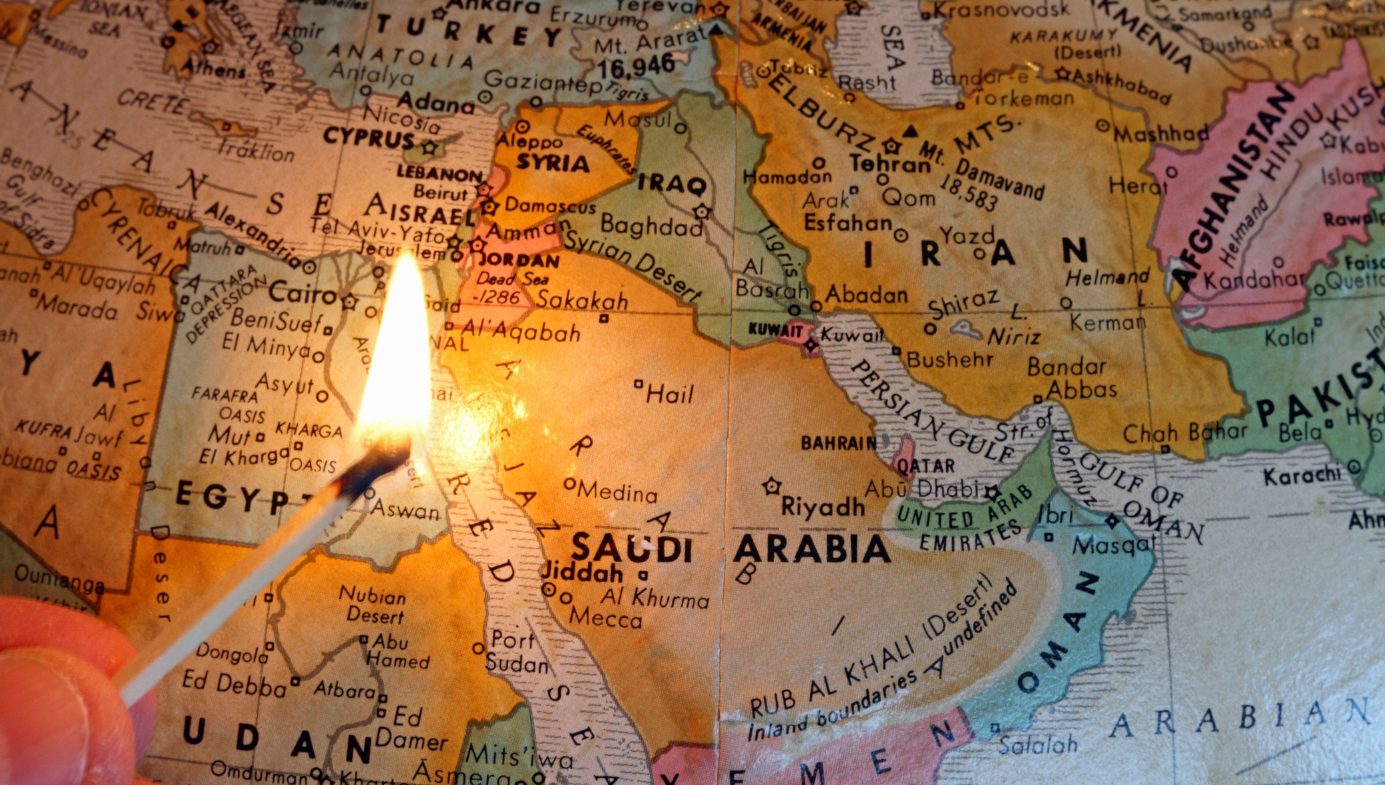Politics
An End to the Mirage
Republicans and Democrats have both learned the wrong lessons from Iraq.

“The Middle East region is quieter today than it has been in two decades.” This observation, which seems to have already receded over history’s lost horizon, came courtesy of National Security Adviser Jake Sullivan barely one week before Hamas’s barbaric invasion of Israel. Speaking at the Atlantic Festival at the end of September, Sullivan described a new Middle East in the making. In recent years, he explained, a burst of diplomacy had established the political and economic conditions for a new equilibrium from the Persian Gulf to Gaza. The implications for the de-escalation of old conflicts were profound. A truce in Yemen, Iranian attacks against US forces down, American involvement in Iraq “stable.” Although regional problems remained, the diminished chaos of the Middle East was allowing the Biden administration to turn its attention to more pressing concerns in other parts of the world.
That quiet, of course, was shattered by Hamas’s religious terror on October 7th. In Sullivan’s remarks—and in a related essay published in Foreign Affairs—he advocated “aggressive diplomacy” rather than military power as the primary currency of American influence. This portrait of the Middle East omitted that it remains a region bedeviled by tyranny and ravaged by terror. These are hardly ideal conditions for beating swords into plowshares. Reports of the eclipse of transnational jihadist organizations by both the Obama and Trump administrations had been greatly exaggerated.
Sullivan also overlooked the abiding menace posed by the Islamic Republic of Iran. For more than a decade, the clerical regime’s hegemonic designs and its pursuit of a nuclear bomb had conscripted Israel into an increasingly intense “shadow war” against the Shi’ite theocracy. The ceaseless activity of Iran’s transnational expeditionary Quds Force included a range of provocations and aggression that threatened to emerge from the shadows at any moment. But the possibility that the lull in the “campaign between wars,” as it is known in the IDF, was merely the calm before the storm had evidently not crossed Sullivan’s mind. As it happened, the relative quiet from the so-called Axis of Resistance—an Iranian-sponsored alliance of jihadist groups that include Hamas and Palestinian Islamic Jihad as well as Hezbollah—was a prelude to a monumental aggression and atrocity. In a single day, a complex and spectacular operation from Gaza spelled the end of an era of peaceful co-existence before it had begun.

In fairness to Sullivan, the blindness to a submerged strategic threat in Gaza and ultimately in Tehran had become a commonplace in Washington. The National Security Adviser was hardly the first member of the American (or, for that matter, the Israeli) establishment to wax lyrical about the prospects of trade pacifying the Middle East. In recent years, a coterie of senior politicians, journalists, and activists—personified by the hapless career of Samantha Power—grew hoarse suggesting that the art of diplomacy was supplanting the art of war. Israel’s failures of intelligence and deterrence grew out of this deeper malaise in American statecraft.
This last point cannot be understated. The reckless decision by Prime Minister Netanyahu and his government to accommodate Hamas—whether this was a move intended to weaken the Palestinian Authority or simply a refusal to take the steps necessary to change the regime in Gaza—would have been impossible had America shown any concern for the fate of Palestinians. But just as Obama had resolved not to drive the Iranians away from the negotiating table with an active policy to topple its client in Syria, so too had Trump resolved not to disrupt the emerging consensus between Israel and its new Arab partners by insisting on fair and equitable treatment of the Palestinians.
At a minimum, this would include stiff sanctions of the sort now being readied against Israeli settlers responsible for attacking and displacing Palestinians in the West Bank. It would also mean retiring the mental and rhetorical habit of imagining that there is no moral problem with the status quo there. For two-thirds of its existence, Israel has held the territory and the occupation’s ultimate authority rests not with any Palestinian but with an Israeli general. Even in areas of the West Bank administered by the PA, there is only limited Palestinian autonomy. Israel is the ruling party there, and consequently, Palestinians and Israelis are treated differently.
America’s attitude towards the Palestinians—at once complacent about strategic threats and indifferent to human rights—ought to be rectified at once if the Biden administration is to salvage a fragile order at a time when the dangers to it are no longer remote contingencies. Ever since the Iraq war, the governing class has drawn the wrong lessons from history. It has warned that any expedition in the Middle East is—and always was—destined to exact an unacceptable price. In this sullen environment, the traditional concepts of military strength and strategic deterrence that defined America’s greatest achievements in foreign policy were out; “minimalism” was in. During the Obama term, former Defense Secretary Robert Gates bitingly suggested that anyone proposing a robust military deployment in that cauldron “needs to have their head examined.” It was time for nation-building at home. After the bloody disappointments of the post-9/11 wars, this counsel of retreat achieved the status of conventional wisdom, exercising a political veto just as binding as “the Vietnam syndrome” had been in a previous generation.
Henceforth, no cause in the lands of Islam was judged so noble, none of its agonies so excruciating, and none of its threats so dangerous, for the United States to bring its power and influence to bear. It seemed for a while as if nothing could dislodge this dogmatic bias against the exercise of American power. The Syrian regime could engage in wholesale slaughter to put down a rebellion with impunity. Red lines to deter the use of horrific weapons were laid down and, when violated, went unenforced. Solidarity with reformers, or the amelioration of tragedies, or protection against grave dangers—all these moral or strategic prompts to action were dismissed as dangerous folly. The nation’s political leadership assured the citizenry that the Middle East could be abandoned with scarcely any negative consequences for America’s interests or its principles.
It’s worth noting that this strategy of retrenchment has been carried out in one form or another by both political parties. Despite significant partisan differences in worldview, contemporary Democrats and Republicans have each badly overreacted to the experience of regime change in Iraq. The upshot is that the liberal order is more imperiled today than at any time in the postwar era. This general failure can be discerned in microcosm in the Middle East. Neither Democrats nor Republicans have yet come to grips with the reality of a tumultuous domain of rival autocracies vying for domination while nurturing a culture of intolerance and religious hatred.
This is a far cry from visions of an end to the strategic competition and conflict that have long entranced the stewards of American power. For years, it has been suggested that some factor or other would usher in an era of good feelings from Tangier to Tehran, obviating the need for continued American engagement in that benighted region. In the age of Obama, that panacea was believed to be the harvest of George W. Bush’s departure from the White House, as if jihadist terror was principally a reaction to the Iraq war. In the years of Trump, it was the Abraham Accords, which were greeted as an act of interfaith harmony begetting perpetual peace.
In the guise of penitence or of providence, this bipartisan font of wishful thinking permitted the United States to withdraw, as much mentally as materially, from a region that had given it so much grief. Even when the reality of withdrawal lagged, the political leadership was happy to indulge the perception of withdrawal. It had decreed that the “forever wars” must end, and that a new era of “mutual respect” (as Obama put it in Cairo in 2009) should commence. After decades of hardship and bloodshed, the lands of Islam were to be regarded not as a zone of disorder and danger that might occasionally justify the use of the big stick. Instead, they were seen as a geopolitical oasis where women are entering the labor force in record numbers and Israeli tourists are thronging to Dubai. No radical designs of regime change or even regime behavior modification required further contemplation; positive indigenous trends simply needed to be stoked by the distant superpower.
It was pretty to think so. Alas, the Orient has not been made anew. The savagery of Hamas has reminded a horrified world that peace is a parenthesis in human affairs and—in large tracts of the Middle East, at least—this remains an epoch of Holy War. Sovereign Israeli territory has been breached, and Jews have once more been slaughtered en masse. The world of Islam has been convulsed by a fresh explosion of antisemitism while the butcher bill for the war against Hamas already numbers in the thousands. The specter of a wider war involving Iran’s surrogates and proxies has only been mitigated by America’s dispatch of munitions to Israel and two aircraft carrier strike groups to the eastern Mediterranean.
At this fraught moment, the world will invite more bloodshed unless the leading power in the world takes stock of what has gone wrong. The colossal mistake on the political Left and in the Democratic Party has been to treat Iran less like a global outlaw than a nation looking to come in from the cold—a potentially “responsible regional power,” to borrow President Obama’s hopeful phrase. This error has been paired with an undisguised desire to create “daylight” between the US and Israel over the latter’s lingering occupation in the West Bank. The result has been an increasingly dangerous clerical regime in Iran and an increasingly chauvinist democracy in Israel. The most belligerent regional dictatorship has been bolstered while America’s closest regional ally has grown estranged from the liberal order.

Meanwhile, the Republican Party in the age of Trump has reversed this formula. The Right’s mistake has been to treat America’s principal ally uncritically, not least over its inhumane occupation of the West Bank. During the entire Trump term, nary a disobliging word was spoken against the settlement project that aims at the annexation of Palestinian land into a Greater Israel. Although its aggressive posture toward Iran—crushing sanctions and the targeted killing of General Soleimani—put the Islamic Republic on its back heels, the lack of critical scrutiny of the Israeli occupation encouraged a galloping nationalism in the Jewish state. That zealous chauvinism in Jerusalem not only cast doubt on Israel’s long-term support in the United States. By wrenching the resources of the state away from the imperatives of national security, it played directly into the hands of Palestinian rejectionists.
In a time of war, there is a special need for sobriety in foreign policy. The beginning of wisdom is to grasp that since the Islamic revolution in 1979, the Iranian regime has harbored a fervent commitment to impose its brand of Shi’ite theocracy on the whole of the Middle East. This mission should have tempered facile notions of a benign post-American order in the Middle East. There was never any chance that history would bend to the will of good intentions. As the primary custodian of world order, the United States never had the luxury of ignoring a vicious terror state or its jihadist hordes who were aspiring martyrs of the One True Faith.
The brazen assault perpetrated against Israel has put paid to dreams of comity—and concomitant designs to reduce the US military presence—in this troubled region. The unmitigated barbarism of Hamas has revealed those dreams to be a lethal distraction from gathering dangers that now must be confronted by force and with urgency.






